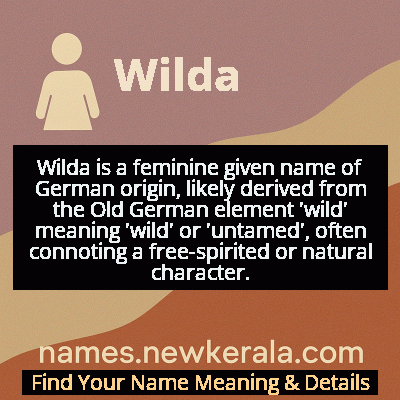Wilda Name Meaning & Details
Origin, Popularity, Numerology Analysis & Name Meaning of Wilda
Discover the origin, meaning, and cultural significance of the name WILDA. Delve into its historical roots and explore the lasting impact it has had on communities and traditions.
Name
Wilda
Gender
Female
Origin
German
Lucky Number
4
Meaning of the Name - Wilda
Wilda is a feminine given name of German origin, likely derived from the Old German element 'wild' meaning 'wild' or 'untamed', often connoting a free-spirited or natural character.
Wilda - Complete Numerology Analysis
Your Numerology Number
Based on Pythagorean Numerology System
Ruling Planet
Uranus (Rahu)
Positive Nature
Strong sense of order, loyal, practical, and disciplined.
Negative Traits
Stubborn, overly serious, rigid, and prone to feeling restricted.
Lucky Colours
Blue, gray.
Lucky Days
Saturday.
Lucky Stones
Blue sapphire.
Harmony Numbers
1, 7, 8.
Best Suited Professions
Managers, engineers, accountants, organizers.
What People Like About You
Dependability, discipline, practicality.
Famous People Named Wilda
Wilda H. Lyon
Botanist and Educator
Pioneering American botanist who specialized in plant taxonomy and contributed significantly to botanical education
Wilda Shakespeare
Actress
British stage actress known for her Shakespearean roles and contributions to early 20th century theater
Wilda Newman
Politician
American politician who served on the Phoenix City Council and advocated for community development
Name Variations & International Equivalents
Click on blue names to explore their detailed meanings. Gray names with will be available soon.
Cultural & Historical Significance
In Germanic cultural context, names derived from nature elements were particularly significant as they reflected the deep connection between people and their environment. Wilda specifically embodies the Germanic reverence for untamed nature - forests, wildlife, and natural forces that were both respected and feared. The name's persistence through centuries demonstrates the enduring appeal of nature-based naming traditions in German culture. While never among the most common names, Wilda maintained a presence particularly in rural areas and among families with strong ties to nature-based livelihoods like forestry or hunting.
Extended Personality Analysis
Individuals named Wilda typically exhibit a remarkable blend of independence and creativity that sets them apart. Their 'untamed' nature manifests as strong self-reliance and an unwillingness to be constrained by conventional expectations. Wildas often demonstrate exceptional problem-solving skills because they approach challenges from unique angles rather than following established patterns. They tend to be highly adaptable, able to thrive in various environments much like the wild nature their name evokes. Their natural confidence often makes them effective leaders, though they may prefer to lead through inspiration rather than authority.
Despite their strong independent streak, Wildas often possess deep emotional intelligence and sensitivity. They form strong, loyal relationships with those who respect their need for autonomy. Many Wildas have a particular affinity for animals and nature, often pursuing careers or hobbies that involve environmental conservation, outdoor activities, or working with animals. Their combination of strength and compassion makes them both formidable advocates and caring friends. While they can be stubborn when their freedom is threatened, they're also known for their generosity and protective nature toward loved ones. The name Wilda seems to attract or cultivate individuals who embody the balance between wild freedom and responsible independence.
Modern Usage & Popularity
In contemporary naming practices, Wilda occupies a unique position as a vintage Germanic name that hasn't experienced the massive revival seen with names like Emma or Charlotte. According to various national naming databases, Wilda ranks outside the top 1000 names in most English-speaking countries, maintaining its status as a distinctive choice. However, it has seen a modest increase in usage among parents seeking nature-themed names with authentic cultural roots. The name is particularly popular in Germany and Scandinavian countries where nature names have strong cultural resonance. Modern parents choosing Wilda often appreciate its combination of feminine sound with strong, independent meaning. The name's rarity makes it appealing to parents seeking unique names that won't be shared by multiple children in the same classroom. Current naming trends suggest Wilda may experience gradual increased usage as the movement toward vintage nature names continues, though it's unlikely to become overly common given its distinctive character.
Symbolic & Spiritual Meanings
Symbolically, Wilda represents the powerful concept of 'controlled wildness' - the idea that true strength comes from harnessing natural energy rather than suppressing it. The name evokes the image of a cultivated garden that still maintains elements of wilderness, symbolizing the balance between civilization and nature. Metaphorically, Wilda represents the untamed aspects of human consciousness - creativity, intuition, and primal wisdom that exist beneath the surface of social conditioning. It symbolizes the courage to be authentically oneself in a world that often demands conformity.
The name carries deep ecological symbolism, representing humanity's connection to the natural world and the importance of preserving wild spaces both externally and internally. In psychological terms, Wilda symbolizes the integration of shadow aspects - those parts of ourselves we might otherwise suppress. It represents the journey toward wholeness through embracing all aspects of one's nature. The symbolic power of Wilda lies in its celebration of natural strength and independence while acknowledging the beauty and necessity of wild, untamed elements in both nature and human character.

